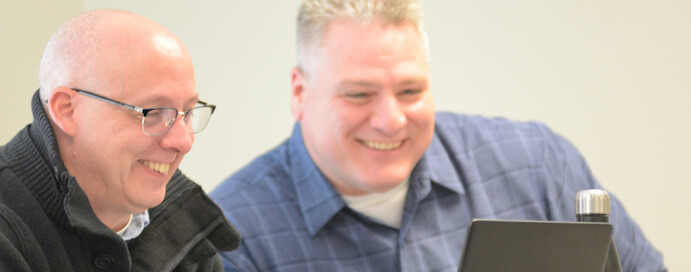Brett Hinds is a chief engineer at Ford Motor Company in Dearborn, MI, where he is responsible for developing the powertrain systems for the company’s growing electric car fleet. Below, we ask Brett (pictured above, on left, with fellow student David Barnett) to share his experiences with the program.
What prompted you to pursue your doctorate?
I had reached a point in my career where I felt my learning was slowing down. I wasn’t learning as much about how to be a better leader. My role had gotten higher in the company, but I felt my formal learning wasn’t supporting me in that role anymore. I wanted a chance to learn more – to be a better, more effective leader. So I started looking into doctoral programs.
I loved getting my master’s degree and wanted to continue formal education, but life (family and career) had taken priority. Now the balance of life finally opened a window for me – I can put the doctoral program into that window.
How is a program like this a good fit for engineers?
Even as a technical leader, I’m still managing people. Engineering programs don’t expose you to classes in ethics, organizational behavior, or leadership ideas. As you advance in your career, you reach a point where your job is less technical and more managerial. But the path hasn’t prepared you for that experience. This program fills in that material you’ve not been exposed to before.
Is what you’re learning applicable at work?
Yes. At a high level, there’s always been these ideas in the back of my head. The doctoral program has taken those feelings and made them thoughts; I’m reading books and talking with leaders and scholars about these ideas that are materializing. It’s the “Ah-ha!” experience for me.
But more specifically, the concept of framing has been interesting for me, and when I learned it I immediately applied it. We frame a project or meeting when we begin it by clarifying the real purpose of the initiative, and the roles each team member is playing. The idea comes from Dr. Amy Edmondson, of Harvard University, who was our first visiting scholar. I went right from class that Sunday to a kickoff meeting about a new project on Monday. Before the meeting started, I announced that I wanted to frame the conversation – why the project was important, why each person was in the room, and how we could make a difference. It let people see why they belonged and how they could contribute. These are questions everybody has when they first arrive.
Literally – I learned something on the weekend, and applied it on Monday morning.
All of sudden you hear something in class and it fills a gap or answers a question you’ve had. It resonates. You can immediately start using it as a way to help your organization and yourself.
What are you hoping to study in your dissertation, and why?
Global leadership is my dissertation topic. It’s a relatively new field of leadership study, so I can contribute to the expansion of knowledge in that area. For me personally, I am a global leader; I lead people who are in different time zones and countries, so by exploring that topic, I can benefit myself and my company too, while contributing to the academic growth of the field.
Learn more about our Ph.D./D.B.A. Program in Values-Driven Leadership. Download our program booklet (click image) or visit our program page.



